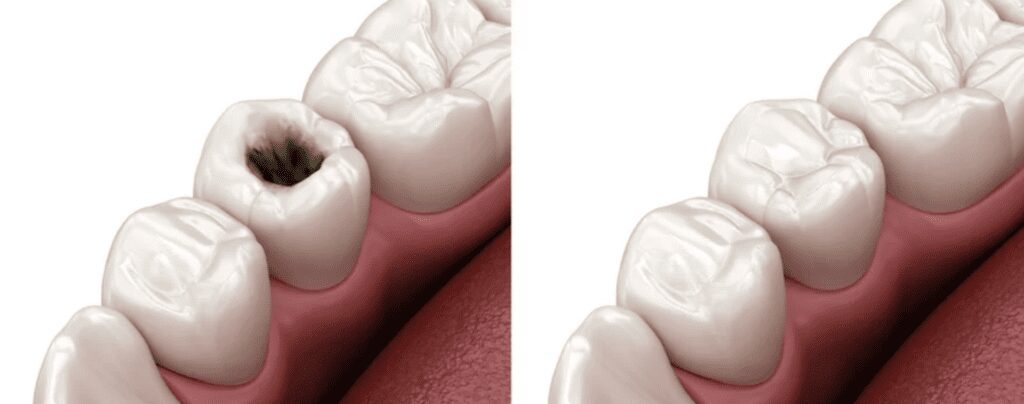According to the Centers for Disease Control and Prevention (CDC), over 90% of adults over the age of 20 will have a cavity at some point in their lives. A cavity is a small pit of decay in the enamel. Over time, the cavity will burrow into the inner layers of your tooth, destroying it along the way.
Initially, you may not feel any symptoms or discomfort. You or a dentist may notice a slight discoloration, but you will only feel pain as it progresses.
Cavities can cause sensitivities to hot or cold temperatures. This is because the decay eats into the inner layers, exposing the nerves and blood vessels. When this happens, you can experience pain or discomfort. Without treatment, the decay can spread into other teeth or your gums.
As long as the damage isn’t too bad, your dentist can quickly fix a cavity with a dental filling. Advanced cavities may require a root canal or a tooth extraction. However, your dentist can treat them at any stage. While you do have treatment options, it is much better to prevent cavities before they start.


Diet
Your diet can go a long way in preventing cavities. Foods that are high in sugar or acid can cause cavities. With sugar, it is not necessarily the sugar that is the problem; it is the bacteria that consume it.
The bacteria that reside in your mouth eat the sugar and convert it to acid. Then, the acid erodes the protective enamel, weakening the tooth.
If you can, reduce the amount of sugar and acidic foods that you consume. You can swap some sugary foods for fruits and vegetables.
Rinse Your Mouth
If you are trying to prevent cavities, it can be tempting to brush your teeth right after you eat. Unfortunately, this can actually damage your enamel and cause cavities. Rather than brushing your teeth, you can rinse your mouth with water.
This will help remove lingering food particles. The bacteria in your mouth will feed on the leftover food as well, creating a similar reaction to sugar. Therefore, it is best to ensure that you remove as much of your meal as possible.
Minimize Snacking
To avoid cavities, many dentists will recommend keeping your snacking to a minimum. If you constantly put food in your mouth, it makes it extremely difficult to remove all the food particles. This will put you in the same cycle of bacteria eating the remaining food, turning it into acid, and destroying your enamel.
Drink More Water
Water can do much more than rinse your mouth and keep you hydrated. In fact, a dry mouth is a breeding ground for bacteria. A condition known as “dry mouth” actually increases your risk of developing cavities and gum disease.
It increases the amount of plaque in your mouth. If you want to minimize the number of bacteria in your mouth, you should try to drink as much water as possible.
